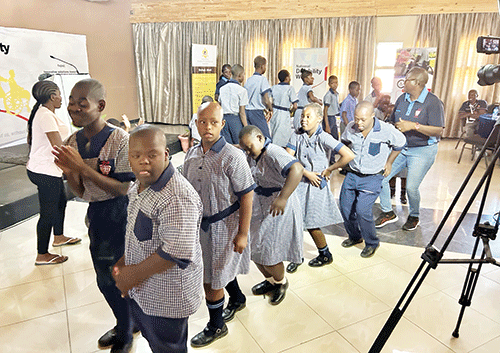The Kunene region tops the list of regions with the highest number of people with disabilities also battling unemployment.
Ebenhard Ripunda from the Namibia Association for Wheelchair Users indicated that 95% of people who have disabilities in the Kunene region are unemployed, while in the Khomas region, it is nearly 70%. “Employment is the common challenge faced by disabled people. We cannot talk more about employment without education,’’ he added.
Ripunda made the remarks yesterday at the commemoration of the National Disability Week underway at Ongwediva, hosted under the theme “Innovative solutions towards the integration of national policies and strategies with the United Nations Convention on the Rights of Persons with Disabilities (UNCRPD) for the creation of a disability-inclusive and accessible society”.
The event is organised by the National Disability Council of Namibia.
Wheelchair user Maria Shigwedha agreed, saying they feel left out.
“We are denied opportunities. People with disabilities lack training and education on how to come up with a business,’’ she said.
Shigwedha noted that there are many calls from youth entrepreneurs and women for training opportunities by the government, but many entities don’t find it suitable for persons with disabilities to be trained to be independent and economically wise.
Speaking at the event, the Employment Equity Commission’s Otilie Tjiurutue said most people believe disability is inability, which it is not.
“These people need to be employed; let them apply if they meet requirements. Employers need to move away from rejecting people with disabilities,” he emphasised.
Chief economist in the Ministry of Trade and Industrialisation Shikongeni Ntinda said there is no awareness within society on the issues affecting people living with disabilities.
“Those people are part of our daily lives; it should be instilled in our minds and accepted,” he urged.
He said the disability council needs to put more effort and encourage people living with disabilities to come up with business enterprises to arrest the high unemployment.
Ntinda stated that their ministry has programmes that are not exclusive, and those living with disabilities should apply.
He said they also noticed a high number of people living with disabilities having no qualifications, which is an additional challenge.
Mathew Hashoongo from the National Federation for Persons with Disabilities in Namibia said there is a need for integration of national policies and strategies. “Our policies and strategies must reflect the principles enshrined in the UNCRPD,” he observed.
He said it is not enough to have stand-alone measures, as true progress lies in the seamless integration of disability-inclusive elements into every aspect of the national agenda. Hashoongo indicated that whether it be education, employment, healthcare or access to public spaces, policies must resonate with the ideals of accessibility and inclusivity.
“We should not deviate from the current problems and challenges facing our communities, the majority of whom are in the rural areas and live in poverty as well as at the same time being excluded from benefits of society and opportunities to improve their lives,” he said.
He added that various disability programmes available lack implementation, and in some instances do not even reach the targeted communities in remote
areas.
Speaking at the same event, deputy minister for disability affairs Alexia Manombe-Ncube said the event creates a platform to sensitise society on the importance of disability mainstreaming.
“Disability mainstreaming is a critical, all-inclusive positive obligation that secures the rights of persons with disabilities,” she noted.
– vkaapanda@nepc.com.na


